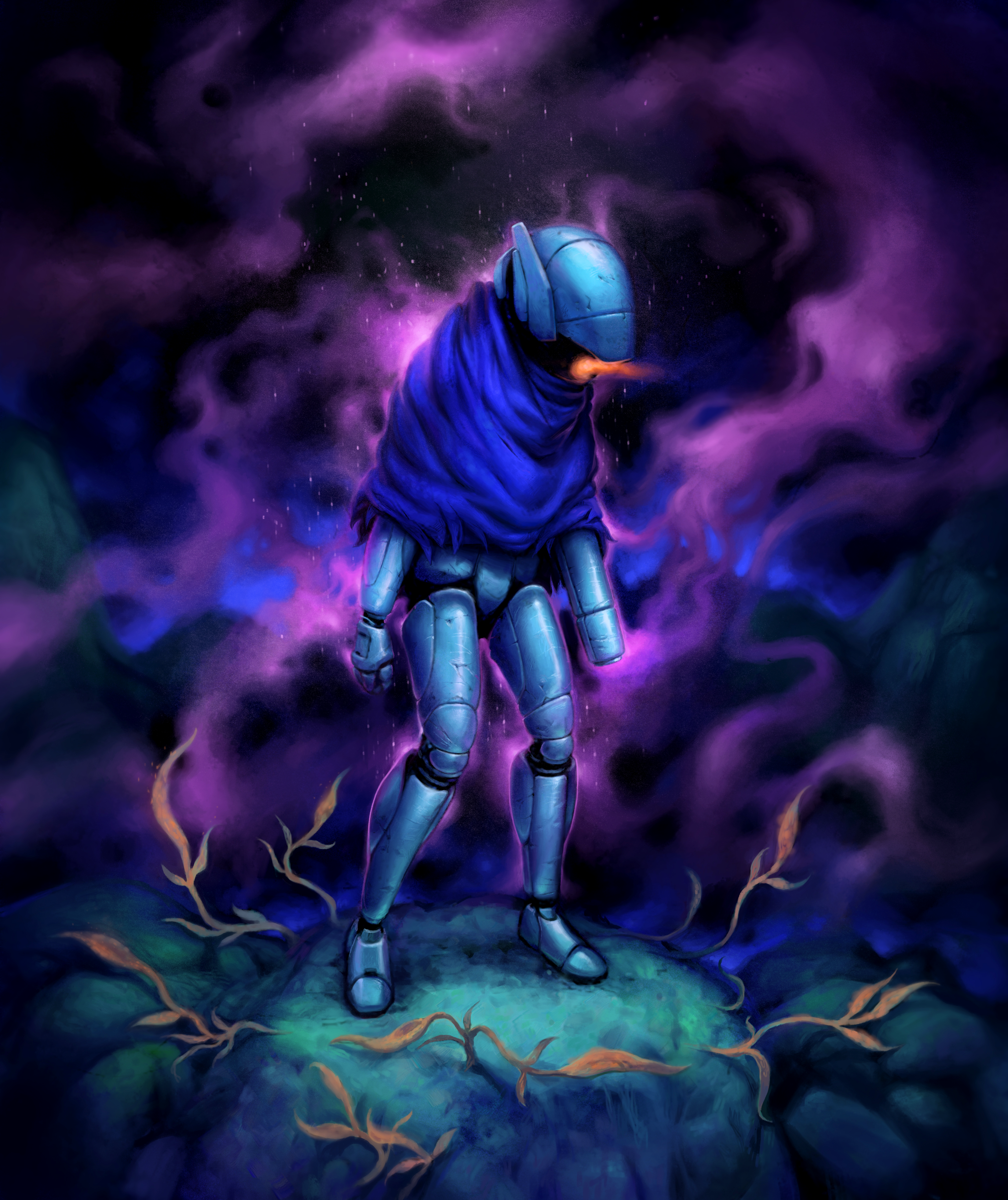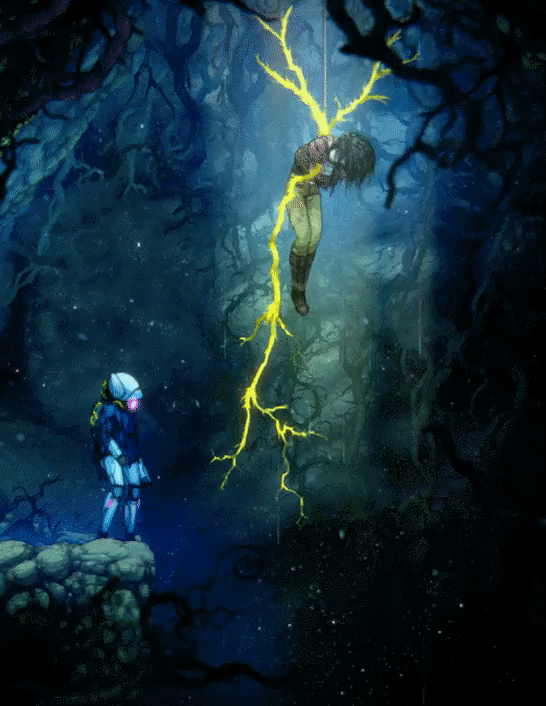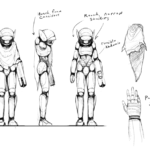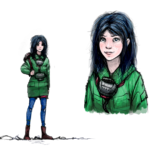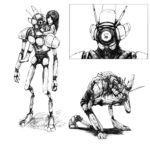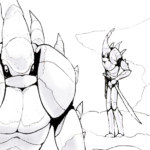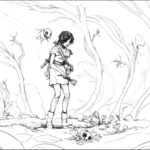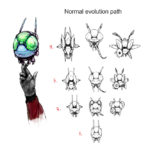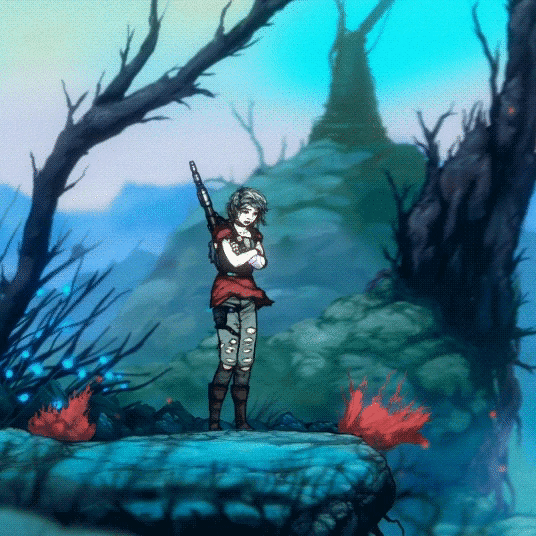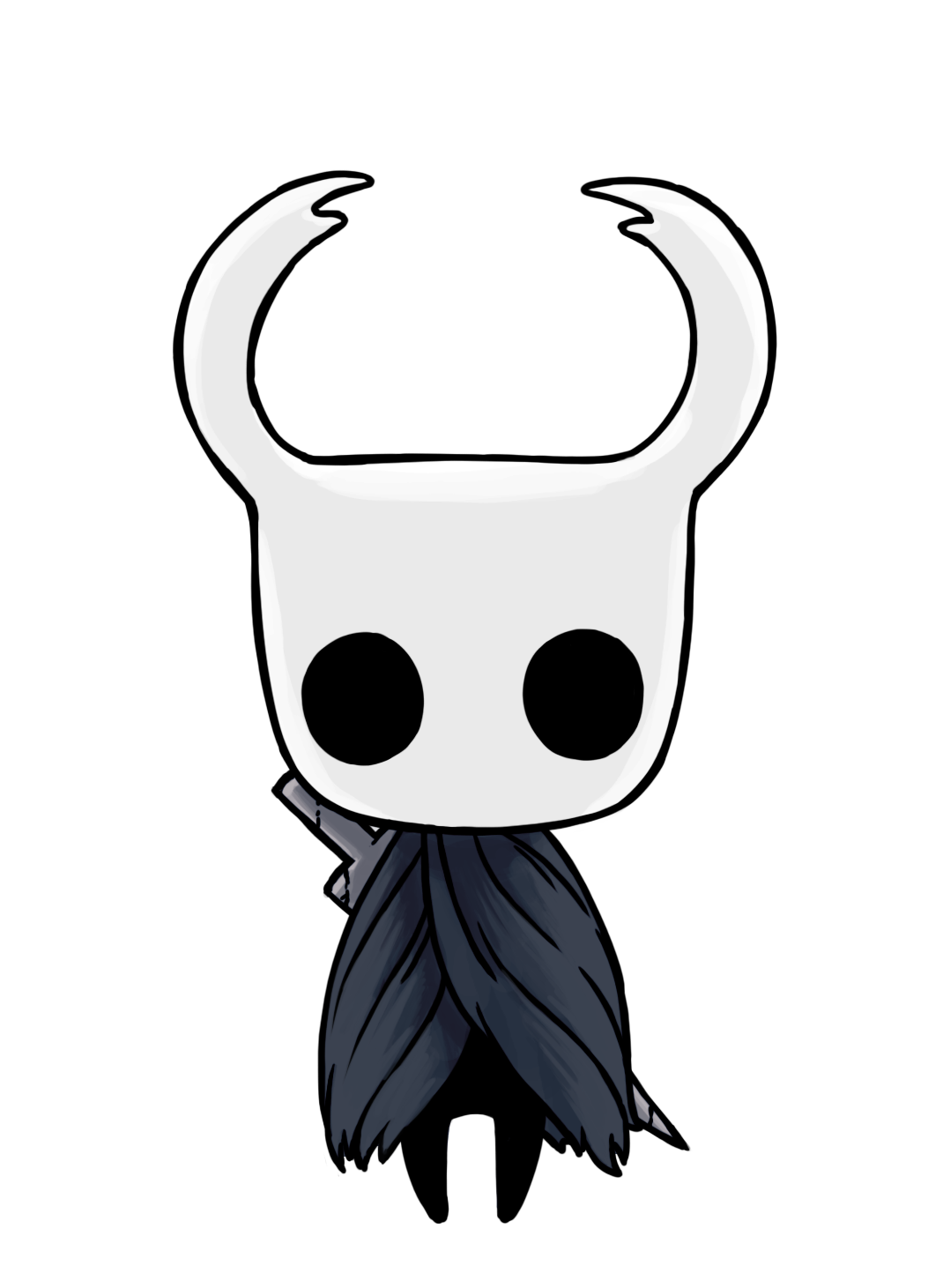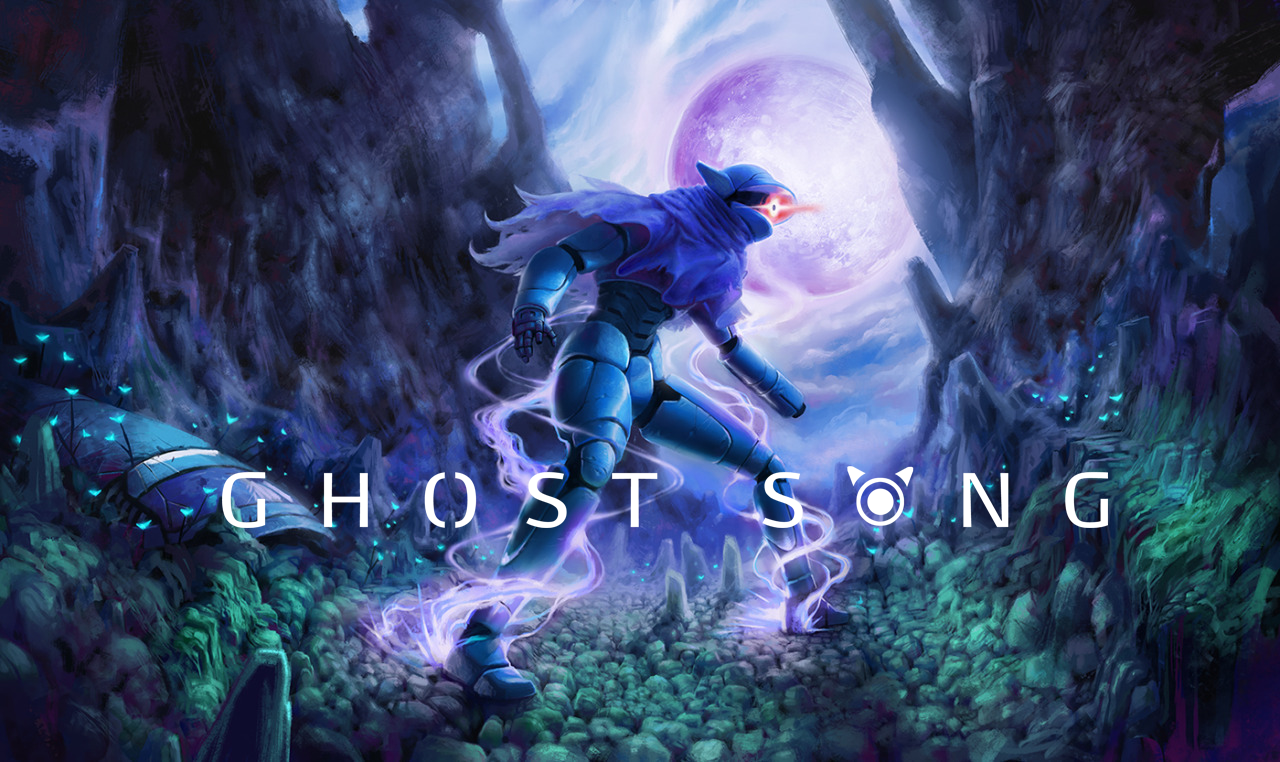
Interview by Rue | June 18, 2019
The upcoming indie game Ghost Song is a Metroidvania that we at the MDb have been excited about for some time now. With its focus on atmosphere, mystery, and horror, you could argue that Ghost Song is already more Metroid than Nintendo’s own recent offerings to the franchise. In this exclusive interview, Ghost Song creator Matt White talks to us about his upcoming game, its development, and his thoughts on the state of the Metroid series. We are very excited to bring you this little preview and hope that you will get a feel for what is to come and share in our excitement.
First of all, what made you want to create Ghost Song?
Creating engaging fictional worlds that would matter to and inspire people is a lifelong aspiration of mine, and game development in particular is something I dreamt about as a child. In the 2000sies I spent a lot of time trying to make various comic/graphic novel ideas happen — to mixed results. As consumer grade game engines (such as Unity) starting rising to prominence and the endeavor became accessible to just about anyone, I realized this was absolutely the way to go. I first took the idea seriously around when Terraria debuted (I think 2011?) and someone told me it was made by just a couple of people. I thought I could do it too and my first game idea was kind of a Terraria/Metroid hybrid. It never made it far into development, but, as with anything, I learned important lessons along the way.
What was your knowledge on game development when you started to create Ghost Song?
Ghost Song is my first truly ambitious project, and it’s something I’ve focused all of my game development energy on since about 2013 (it has undergone a couple of reboots and gone through several forms since that time). Prior to that I made several flash games (one of which I ended up making about $500 off of via a flash portal!) and participated in some game jams.
How big is the Ghost Song development team?
Most of the day to day work right now is done by me. I do have a great support structure, though — I have a writing partner, a programming consultant, and a Discord server full of lovely people who are always ready to give feedback. I have and will outsource much of the audio to others (music and VO in particular). What I specifically do — I personally handle the thrust of the game design, all of the artwork, and virtually all of the programming. It’s my baby.
What has been the most challenging part(s) of creating Ghost Song?
Getting my head around it and seeing it objectively as a whole. This is something that’s really hard to do — I view game development (at least the type that I do) as many many small tasks, most of which are pretty easy to manage on their own, but are so numerous that it just goes on forever.
If I was going to get specific, I’d say building the visual aspect of the environment. It’s exhausting. In a game like this, it needs to be big, and engaging, and beautiful, and this means an incredible, incredible grind. Many rooms — hundreds — exist on the map, most of which take hours apiece to dress with artwork. I can rarely get away with just repeating a tiling pattern and moving on. I have a very organic process. I’m proud of the results, but it takes a lot of time to achieve.
Deciding on the appropriate scope and whittling things down to what is most important is also an incredible challenge, and I have a history of maybe trying to take on too much.
Any advice for anyone interested in getting into indie game development?
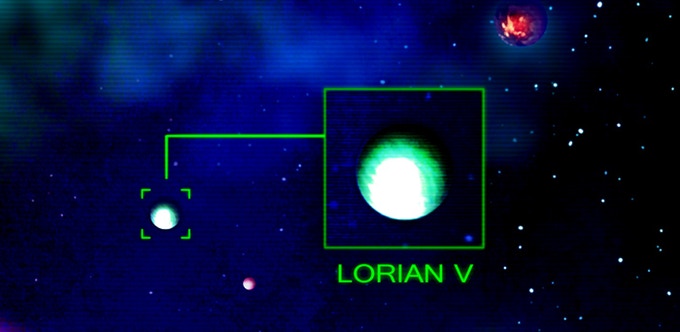
“Lorian V, a moon haunted by the souls of its victims; ghosts who linger on while their twisted bodies roam, no more than empty vessels of chaos and aggression.” -Matt White
Identify what the fundamental pillars of your game are and why exactly it excites you — write it down in big simple phrases and tape it to the wall near your workstation. My experience is that it’s very easy to drift over time and kind of lose the plot — each little fix or adjustment or knee jerk reaction to some new inspiration can take you further away from what your game *actually is*. The scenario of being physically confronted with what your game is and what it *needs* to be — every day — Actually can help.
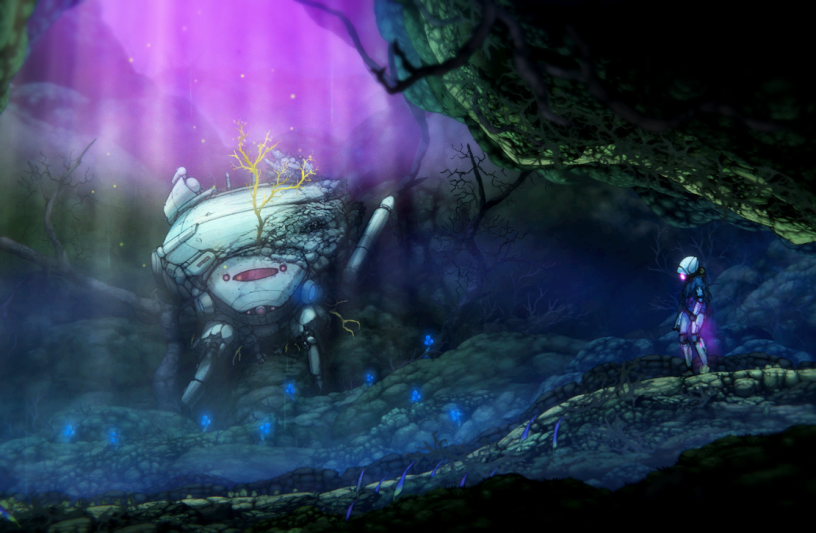
“My fascination with weathered, beat up robots and beat up space ships and beat up everything is all Star Wars.”
One of our favorite things is Ghost Song’s focus on atmosphere. The lighting, music, sound, exotic plants and creatures all enhance the feeling of isolation on an alien planet. What was your inspiration for the setting of LORIAN V?
Super Metroid was a starting off point. I’m also greatly inspired by the works of Studio Ghibli, who consistently create visually stunning and believable fantasy worlds. I’ve been fascinated by game worlds that feel indifferent to your presence since I first played Super Metroid. I want the game out of the way — I don’t want it to cater to me, I don’t want it to tell me what to do, and I don’t want to feel like a game designer is hovering over my shoulder. These priorities will be very evident in the final product. Alien world, alone, explore. You may discover what it is you’re searching for, you may not. That’s it.
The lore of Ghost Song seems very mysterious, creepy and bleak, are there any Sci-Fi, or Horror, authors (or Films) that you feel inspired it?
Ghibli Films (especially Nausicaa), Blame!, Battle Angel Alita, Aliens, Star Wars — Who I am as an illustrator and designer are just hugely influenced by all of these things, and you’ll see familiar elements from many of them. I learned to draw by studying manga. My fascination with weathered, beat up robots and beat up space ships and beat up everything is all Star Wars.
‘Environmental Storytelling’ is a word you have mentioned on social media previews of Ghost Song, with the world hinting at things but not quite telling. There are also some previews [old build] of characters speaking to the protagonist. How do you strike a balance between these two content delivery tools?
I have a general philosophy of keeping the player in the driver’s seat, and rarely imposing anything on them. There absolutely should be a rich and coherent story, but it should be up to the player how they experience it. Something that you found – yourself – because the world pulled you in will inspire your imagination and create a connection to the material in a way that a forced exposition dump or cutscene never will, because you take ownership of it. That was your moment. The game didn’t rub your nose in it. With respect to NPCs — They exist and occasionally will speak to the player, but not at the cost of the player’s agency. It’s not that kind of game.
To further facilitate this overall approach to storytelling, the game has a system inspired by old CRPGs whereby the player can inspect things in the environment to read about what they’re seeing. Again, totally optional, but there’s information there if the player wants it.
Player freedom is everything. To the extent that it’s practical to achieve, every single thing is designed to work the way it seems like it ought to. That’s one of my core philosophies for this game. If you see a character, you can talk to them, or ignore them, or kill them (or perhaps die while trying to kill them). The game won’t get in your way. There is no NPC who operates by different rules than the others.
“If you see a character, you can talk to them, or ignore them, or kill them (or perhaps die while trying to kill them). The game won’t get in your way.”
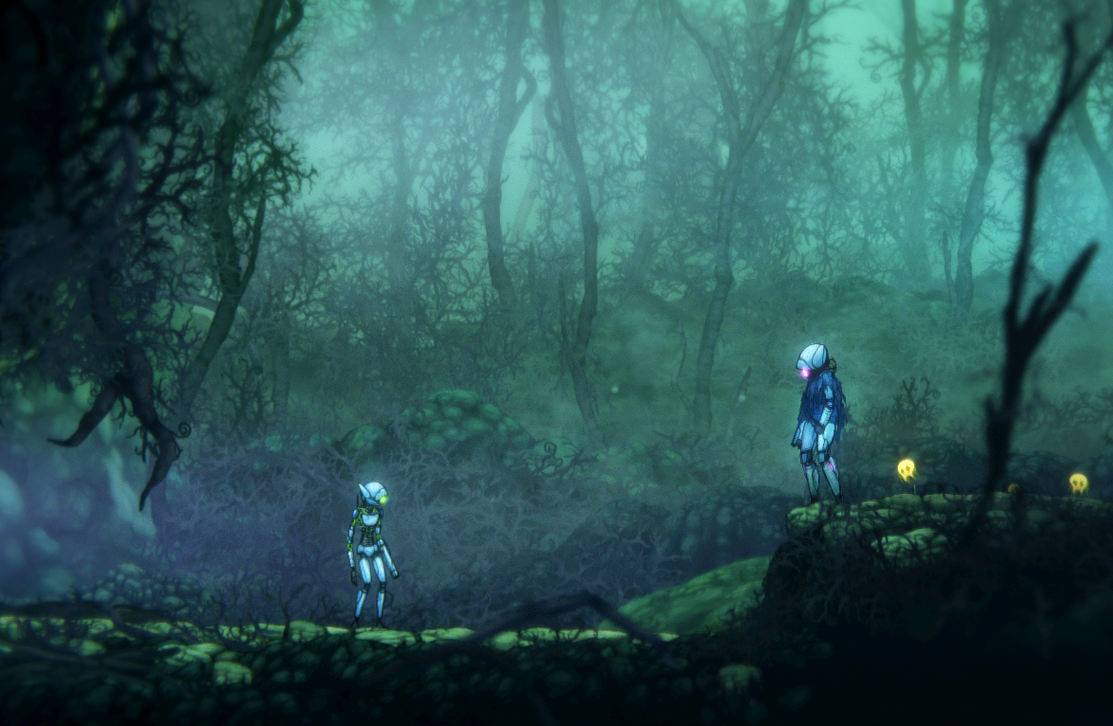
How many controllable characters are planned?
In a very early version of the game I had planned to include a portion of the game where you took control of another character, but I was never able to exactly justify why this was in place. The approach now is to keep things pure, so there is only one character that will be playable in the base game. I wouldn’t rule out doing other things later, perhaps as an expansion, but I can’t devote serious time to that right now.
I should point out that the character has a mysterious identity (making it quite possible to project yourself into them if you desire), and has a number of customization options. You will also be able to choose from three starting classes that play considerably differently from eachother (especially early in the game). Same character, but a lot of choices about how to play, ranging from guns, to melee, to some more magicky stuff.
“Getting a new power that changes the way I interact with the world in general – thereby opening new routes – is fine. That’s how it should be. Getting a contrived power whose only real purpose is to be a key is not fine. I want freedom.”
We’ve seen GIFS of some awesome looking weapons. How many weapons and powerups are you expecting in the final game? Will acquiring them all be necessary to finish the game?
Right now there are 45 upgrade modules. 18 of those are discretely different weapons. These modules grant bonuses or interact with abilities to modify them.
In addition to the modules, there are specific powers/moves you can gain. The current count is 14 (7 tech powers, 7 spirit powers) but there are a few things that could still change.
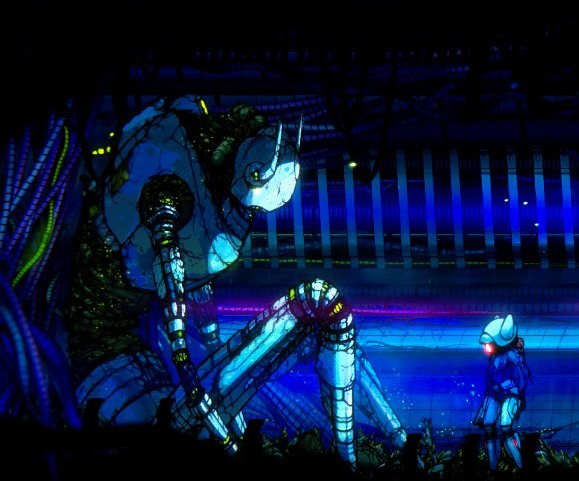
[Left] A robot entity, in one of the many ‘Droid Labs’, that you can use to level up, make repairs, fast travel, and more.
Getting a new power that changes the way I interact with the world in general – thereby opening new routes – is fine. That’s how it should be. Getting a contrived power whose only real purpose is to be a key is not fine. I want freedom.
How long, do you feel, it will take the average gamer to complete the game?
I can’t even hazard a guess. Last time I had a public demo the play times ranged from 30 minutes to 10 hours. People will take this completely at their own pace, especially since most of it is optional. I would hope to have enough material for someone to have a great time for a good 15-20 hours (if not longer), but I can’t predict yet how people will play.
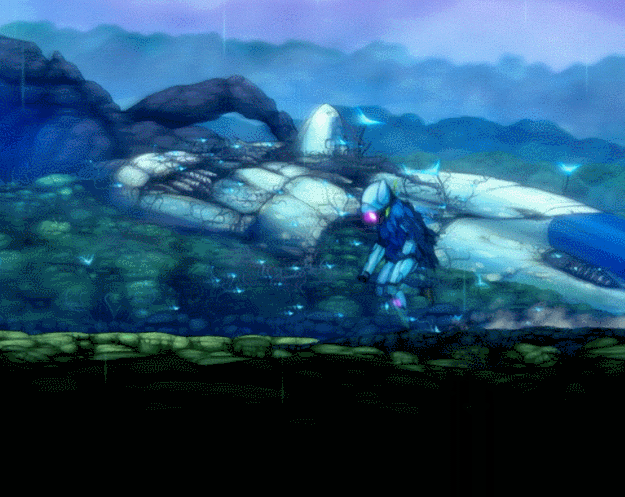
Attention to detail. Your characters suit will react to the environment with dirt and blood staining its exterior.
Will speedrunning be integrated into the game design?
I like speedrunning, but that’s their world. I’ll make a game, and if speedrunners enjoy the game I’ve made they’ll start deconstructing it and determining the best way to play fast. That’s awesome, but I don’t really consider that stuff when designing. The fact that it’s very open means it’ll be possible to see credits very quickly, though, I suspect. Seriously, it’s very open, and if seeing end credits is your only goal I suspect you’ll find a way to do it quickly.
What platforms would you like to see GS released on?
Right now I’m just focused on making the game for PC, but it’s designed to be played on a controller. I’m a console lover, so once it’s done I’ll definitely be looking to get it on as many of them as possible.
What is your favorite Metroid game?
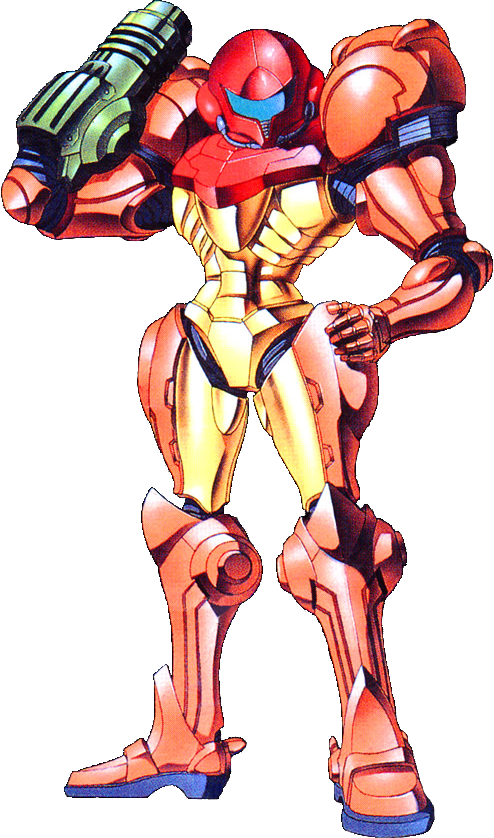 Super Metroid is my favorite, and Metroid Fusion is my second favorite. These are the strongest games in the franchise. That’s my opinion, anyway. Super Metroid was bold and daring and fresh for its time in ways that none of the other games really were. It’s an all time classic. Fusion as my second choice may be a bit more controversial, but I recognize it as a game that is much more inspired than most of the other games. It’s not as open, sure, and the elevator dialog is a bit lame — But the ideas, the art design, the encounter design — They’re all amazing.
Super Metroid is my favorite, and Metroid Fusion is my second favorite. These are the strongest games in the franchise. That’s my opinion, anyway. Super Metroid was bold and daring and fresh for its time in ways that none of the other games really were. It’s an all time classic. Fusion as my second choice may be a bit more controversial, but I recognize it as a game that is much more inspired than most of the other games. It’s not as open, sure, and the elevator dialog is a bit lame — But the ideas, the art design, the encounter design — They’re all amazing.
“Metroid needs its Breath of the Wild moment, not a routine installment in an old series,…”
How do you feel about the current direction of the Metroid franchise? What would you change?
I think Metroid needs a complete reboot. I’m sad to see that they’re apparently focusing on making a numbered sequel to Prime. Metroid needs its Breath of the Wild moment, not a routine installment in an old series, one that I feel has a spotty track record, and one that I feel has a very troubled and conflicted core design proposition. We need a completely fresh and inspired take on the franchise and a total reboot, and hopefully one that reacquaints itself with the priorities of the original games. Freedom, openness, isolation. I hope one day we get it.
Is there an indie developed Metroidvania that you think stands out from the rest?
Only indies seem to be able to do this genre right these days. I wonder why that is? I think Hollow Knight is the high water mark. As a whole product it doesn’t get much better.
The staff of the Metroid Database would like to thank Matt for his time and for answering our questions. We hope Ghost Song ends up a huge success. Follow the progress of Ghost Song on Twitter & Discord. Release date TBA.
